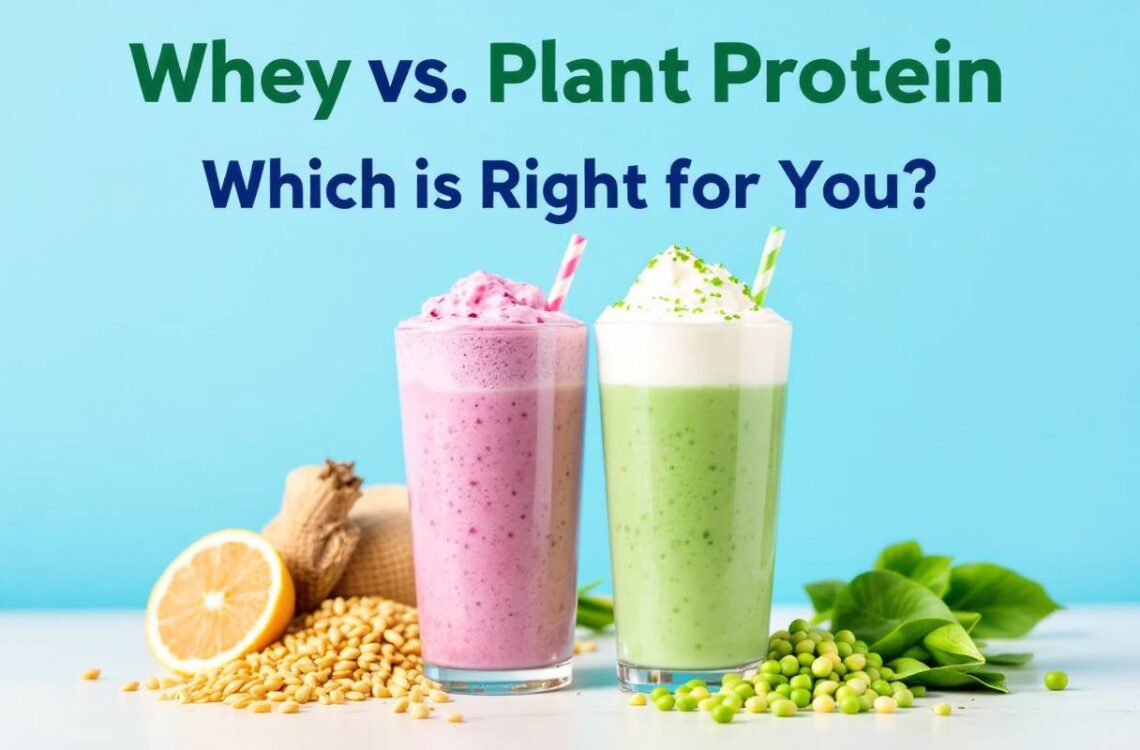When it comes to Whey vs Plant Protein, making the right choice can significantly impact your fitness journey. The Whey vs Plant Protein debate continues to engage fitness enthusiasts seeking optimal nutrition.
Confused about which protein is right for your fitness journey?
You’re not alone in the great protein debate of Whey vs Plant Protein-based options. As the foundation of muscle building and recovery,
choosing the right protein type can make or break your fitness goals. Whether you’re a dedicated athlete, following a plant-based lifestyle, or simply looking to optimize your nutrition, understanding the differences between whey and plant proteins is crucial.
From absorption rates and amino acid profiles to environmental impact and dietary considerations,
we’re about to unpack everything you need to know about these protein powerhouses.
Ready to discover which protein source aligns perfectly with your needs and goals?
Let’s dive into the ultimate comparison of whey and plant proteins.
Whey vs Plant Protein: Understanding the Basics
When comparing whey and plant protein, knowing the basics and perks of each helps you make the best choice for your needs.
Importance of Protein in Fitness
Protein is like your secret weapon when it comes to fitness and staying healthy. It’s the building block for muscles, boosts your immune system, and gives you that needed energy boost. Whether you’re pumping iron, running marathons, or just trying to keep fit, getting enough protein is key to crushing your goals. For more on picking the right protein, hop over to our guide on how to choose protein powder.
“The source of protein matters less than ensuring adequate total protein intake and proper amino acid composition. Both whey and plant proteins can effectively support muscle growth and recovery when properly formulated.” – Dr. Stuart Phillips, Professor of Kinesiology
Whey Protein Overview
Whey protein comes from milk during the magic of making cheese. It’s the go-to for athletes and bodybuilders, thanks to its high-quality protein that’s quickly absorbed.
| Characteristic | Whey Protein |
|---|---|
| Source | Milk |
| Biological Value (BV) | 104 |
| Absorption Rate | Fast |
Benefits of Whey Protein:
- Packed with all nine essential amino acids
- Quick to digest and absorb
- Great for muscle health and repair
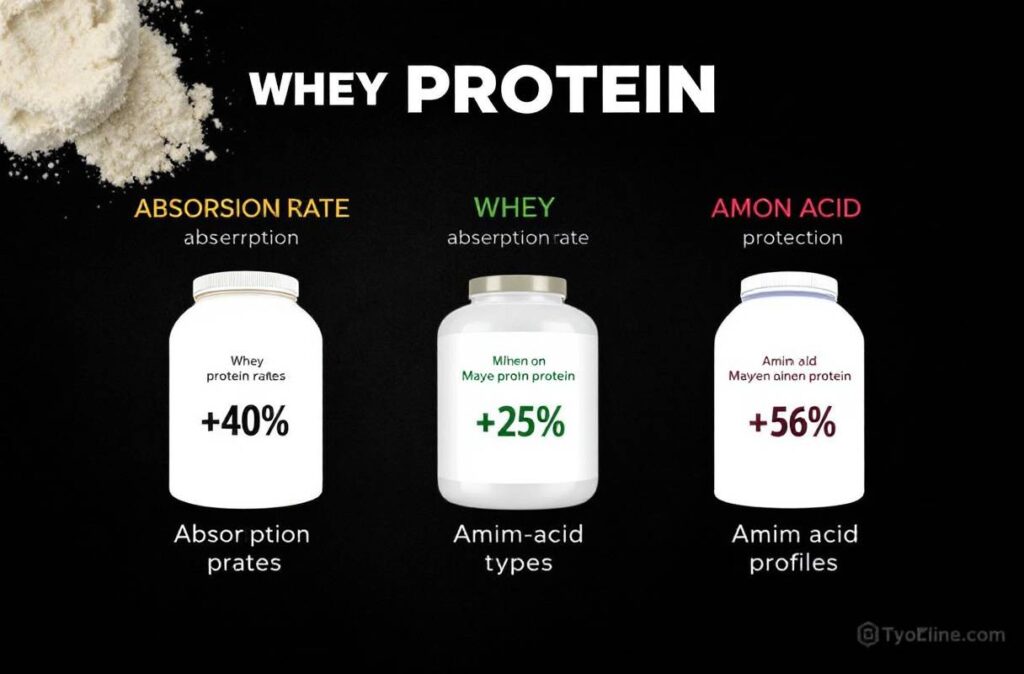
For those chasing gains and speedy recovery, whey protein pairs well with creatine supplementation for an extra kick.
Plant Protein Overview
Plant protein is a blend of goodness from sources like peas, rice, soy, and hemp. It’s perfect if you’re vegan, vegetarian, or got a beef with dairy.
| Characteristic | Plant Protein |
|---|---|
| Source | Plants (like peas, rice, soy) |
| Biological Value (BV) | Varies (74-96) |
| Absorption Rate | Moderate to Slow |
Benefits of Plant Protein:
- Friendly for vegans and vegetarians
- No dairy, no lactose
- Usually packed with fiber and other goodies
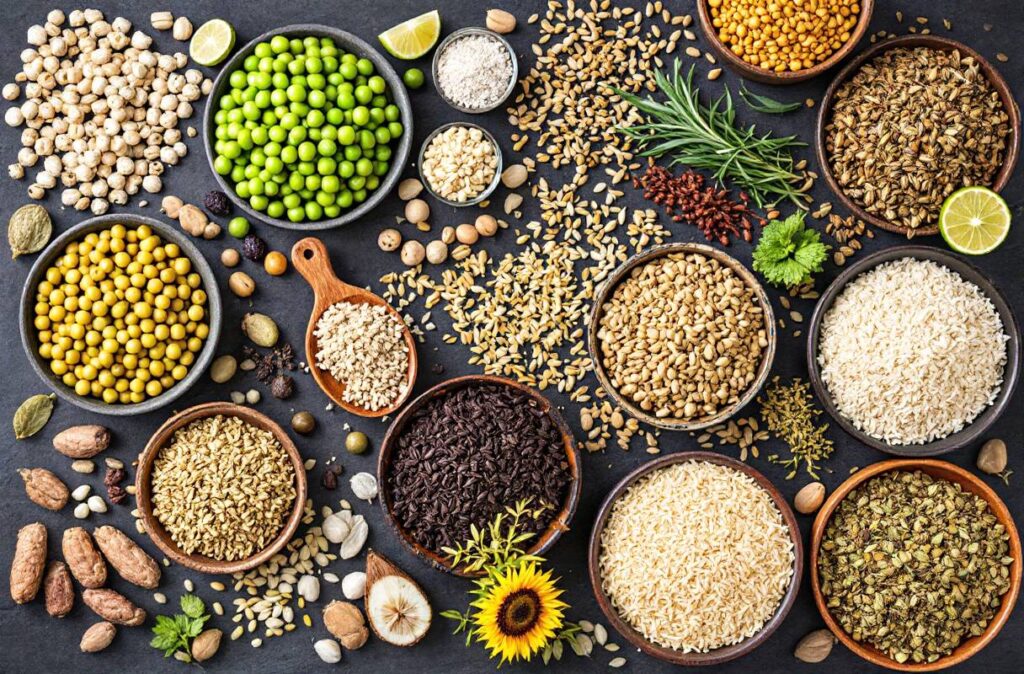
The variety in plant protein sources means each has its own perks. Soy protein checks all the essential amino acid boxes, while pea protein is rich in BCAAs—so you can find the best vegan sports supplements for your game plan.
By getting a handle on these proteins, fitness fanatics can adjust their diet to match their lifestyle and smash their fitness dreams.
Whey vs Plant Protein: The Nutritional Battle
We’re diving into the grudge match between whey and plant-based protein; it’s like a heavyweight bout in a protein shake bottle! We’re gonna chew over protein content, quality, how our tummies handle digesting this stuff, and which micro-goodies each type brings to the table.
In the Whey vs Plant Protein comparison, nutritional content plays a crucial role in determining which option best suits your needs.
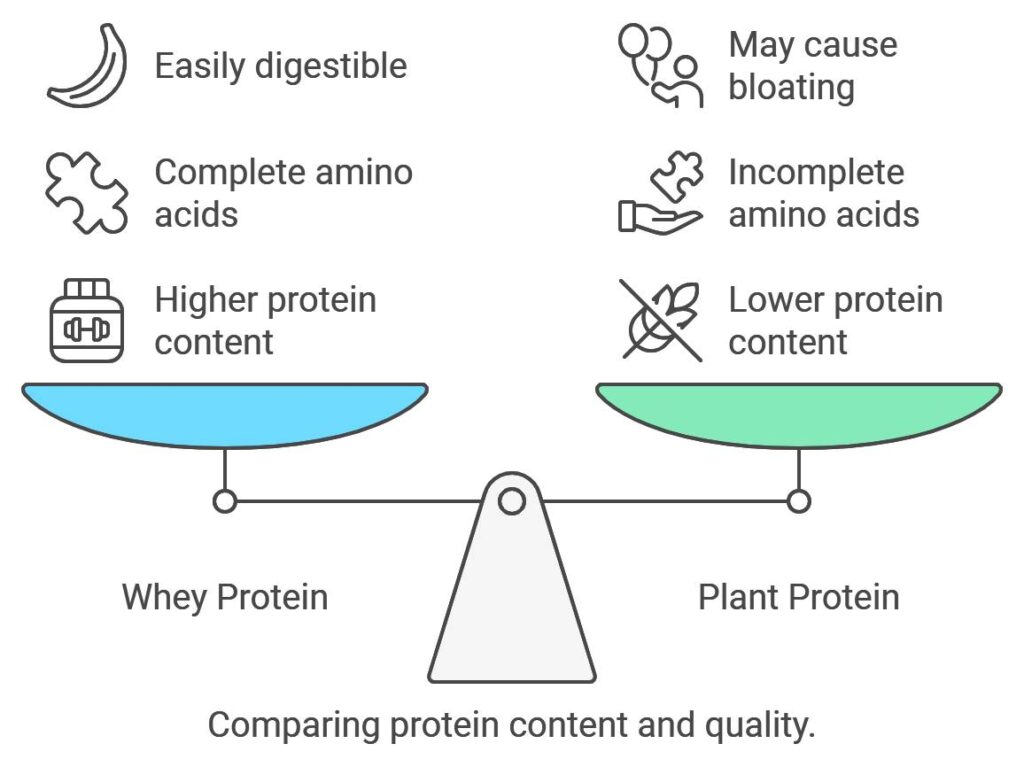
Protein Content and Quality
When picking a team—whey or plant—protein content and those irresistible amino acids are the game-changers. Whey protein’s the champ, packing all those key amino acids, scoring a homerun as a complete protein. Meanwhile, plant proteins kinda vary, sometimes missing a few players. But hey, mix ’em up right and you got yourself a winning squad of amino acids!
| Feature | Whey Protein | Plant Protein |
|---|---|---|
| Pound of Protein (per 100g) | 70-80g | 60-70g |
| Essential Amino Acids | All there | Might skip some |
| Biological Value | 104 | 80-90 |
Need the 411 on picking the top protein powder for you? Check out our guide to protein powder.
Whey vs Plant Protein: Digestibility and Absorption
Digestibility and how quick the body absorbs protein play key roles in getting the most bang for your buck. Whey protein speeds through digestion like a gazelle after a workout, with the body happily snapping it up. Plant proteins take the scenic route—variable digestibility often affected by fiber content.
| Feature | Whey Protein | Plant Protein |
|---|---|---|
| Digestibility Score | 1.00 | 0.70-0.90 |
| Speed of Absorption | Fast track | Cruise control |
| Fiber Load | Low | Depends, can be hefty |
Get to know what fuels you after workouts with our post-gym recovery tips.
Micronutrients
Now, let’s zoom in on the little stuff like vitamins and minerals that set whey and plants apart. Whey’s a dairy darling, bringing calcium and B-vitamins to the party. Plant proteins? Well, they’re like the fruit punch of protein with lots of different vitamins, minerals, and even magical phytonutrients, especially when you’re dealing with seeds and legumes.
| Micro Goodies | Whey Protein | Plant Protein |
|---|---|---|
| Calcium | Up there | Kind-of there |
| Vitamin B12 | Yup | Nope |
| Iron | Nah | Yeah! |
| Magnesium | Meh | Boom! |
Curious about going au naturel? Peek at our vegan sports supplement tips.
Getting to grips with what’s inside whey and plant proteins helps you steer towards the right nutrition for your diet and goals. If you’re ready to become a stacking ninja, check out our how to stack supplements guide.
Performance and Recovery
Studies comparing Whey vs Plant Protein show different advantages for muscle growth and recovery.
The showdown between whey and plant protein goes beyond just nutritional stats—how these affect your workout and recovery makes a huge difference, especially for folks serious about fitness. Here’s a down-to-earth look at how both muscle up, keep you going, and help you bounce back.
“While whey protein has traditionally been considered superior for athletic performance, advances in plant protein formulation have closed the gap significantly. The choice often comes down to individual needs and preferences rather than absolute superiority.” – Dr. David Rogerson, Sports Nutrition Researcher
Muscle Building and Repair
Protein’s got one job, and it’s crucial—build and fix muscles. Whey is like the champ here, loaded with all the key amino acids and a hefty dose of branched-chain amino acids (BCAAs), which are the MVPs in packing on muscle.
Now, if you’re into plant power, stuff like pea or hemp proteins boast these essential amino too, although their BCAA game ain’t always as strong. But here’s the hack: mix different plant proteins and you’ve got a full batch of amino acids, perfect for building muscles.
| Protein Source | Leucine (g per 100g) | Biological Value |
|---|---|---|
| Whey Protein | 8.5 | 104 |
| Pea Protein | 8.5* | 65 |
| Hemp Protein | 6.0 | 49 |
*Partnered with other plant proteins for that complete amino punch.
Energy Levels and Endurance
Keeping your pep up is vital, no matter if you’re just starting or you’ve got ironman goals. Whey’s a quick burner, fast-tracking amino right into your system after a sweat sash to help you recharge on the fly.
Plant proteins take their sweet time digesting, which isn’t necessarily a bad thing. This can keep energy flowing nice and steady, ideal for those marathon sessions where you need to stay fueled longer.
Curious about how to up your energy game? Swing by endurance supplements for the lowdown.
Recovery Time
Bouncing back from a workout? That’s where the quick action of whey protein shines, racing through your system to help revitalize muscles fast. Thanks to those BCAAs, it cuts down muscle ache and speeds up the bounce-back time.
Although plant proteins process slower, they aren’t slackers in the recovery department. Blend different plants, and you’re getting a solid amino profile. Some even pack a punch with antioxidants, helping to cool down inflammation and get muscles back in action sooner.
Dig into more about recovery helpers in our piece on post-workout recovery supplements.
| Protein Source | Digestion Speed | Recovery Effectiveness |
|---|---|---|
| Whey Protein | Fast | Top-notch |
| Pea Protein | Moderate | Solid |
| Hemp Protein | Slow | Decent |
Knowing the ins and outs of whey and plant protein can be a game-changer for making choices that fit your unique fitness path and diet. Check out our guide on choosing protein powder for extra tips on finding your perfect match.
Dietary Considerations
In the epic clash between whey and plant proteins, what you eat and your personal quirks matter a lot. Different strokes for different folks, right? Here’s how these proteins stack up on common dietary hang-ups.
Allergies and Sensitivities
Whey protein comes from milk and can be a bummer for those with dairy issues. Think bloating or feeling like a hot air balloon. Not fun. In contrast, plant protein? It’s like a free pass for most folks with food issues. Few people break into hives over peas or rice.
| Protein Type | Usual Suspects (Allergens) | Cool for Lactose-Free Life? |
|---|---|---|
| Whey Protein | Milk and Lactose | Nope |
| Plant Protein | Zilch | Yup |
Vegetarian and Vegan Diets
If you’re riding the veggie train or counting kale leaves, plant protein is your jam. Whey’s off-limits if you avoid animal stuff. But plant proteins like pea or hemp keep you chugging along without veering off your ethical diet path.
Wanna see how plant power benefits athletes? Check out our vegan sports supplements piece.
Digestive Health
Keeping the tummy happy is key, too. Whey is easy for the body to use, but it might lead to grumbly tummies or, ahem, urgent bathroom visits for some. Plant protein usually goes down smoother and often packs a fiber punch, making things flow nicely.
| Protein Type | Bendiness (Ease of Digestion) | Tummy Troubles Likely? |
|---|---|---|
| Whey Protein | Meh | Yep |
| Plant Protein | Great | Nah |
Matching your proteins with your belly’s vibe? Smart. Kinda like picking the right heat protectant for hair straightening to keep everything in tip-top shape.
By nailing down these food facts, you get to make a smarter choice between whey and plant proteins. Both have perks and quirks. Chat with a nutrition pro for a real-time guru on what fits your mojo. And, for more scoop on picking the right powder, head over to our how to choose protein powder guide to stay on track with those fitness goals.
Environmental Impact
The environmental footprint of Whey vs Plant Protein production differs significantly. It’s high time we got a grip on what protein munchies are doing to our planet, right? Let’s have a little chat about the eco-angles of whey protein and its leafier cousins—the plant proteins—and see what their footprints look like on Mother Earth.
Sustainability of Whey Protein
So, whey protein—is literally the cheese to someone else’s bread, coming from good old cow’s milk. But before you cheer, remember that getting it to your shelf isn’t exactly a walk in the park for the planet.
What’s Eating Sustainability Here?
- Land Ho: Dairy farming gobbles up loads of land, turning grass into glass—milk, that is.
- Water Galore: Think of a cow as a walking water sponge—dairy needs gallons upon gallons.
- Gas Guzzlers: Cows let out methane like it’s their job—a hefty greenhouse gas.
Sustainability of Plant Protein
Now let’s switch gears to team green—peas, soybeans, and rice. These veggies come with their own environmental baggage but pack a lighter punch than their mooing counterparts.
Chill Environmental Factors:
- Land Tamer: Plant proteins munch up way less land to grow their scrumptious selves.
- H2O Champs: They sip, rather than guzzle, water compared to our bovine buddies.
- Gas (Or Lack Thereof): Plants play it cool on the gas front, letting off fewer emissions.
| Factor | Whey Protein | Plant Protein |
|---|---|---|
| Land Use | Big | Small |
| Water Consumption | Thirsty | Manageable |
| Greenhouse Emissions | Sky-high | Way Lower |
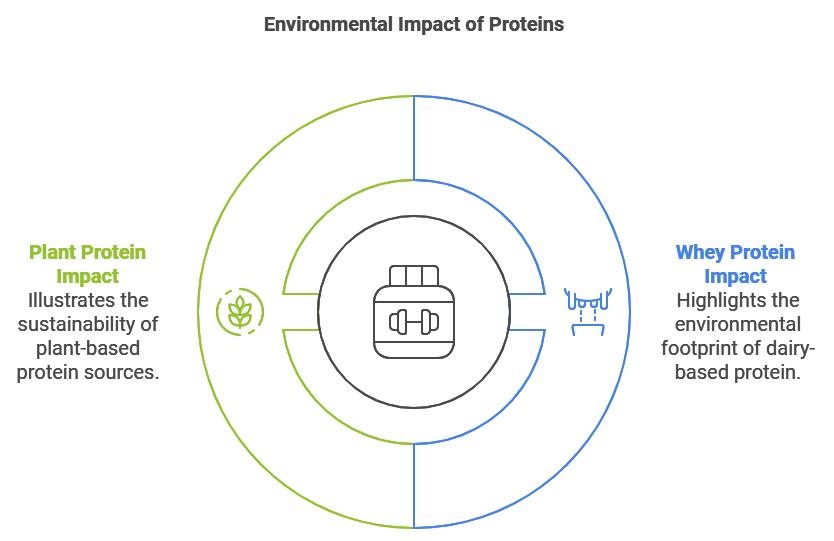
Carbon Footprint
Now, onto the big ol’ carbon footprint scene. The race between whey and plants is quite the mismatch in emissions land.
Whey Protein:
- Whey’s carbon numbers ain’t small, thanks to milking processes and the energy it takes to turn that milk into the powder you power up with.
Plant Protein:
- Plants come in with a lesser carbon cap—agricultural emissions can’t rival those cow-sized numbers.
| Protein Type | Carbon Footprint (kg CO2 per kg protein) |
|---|---|
| Whey Protein | 9.2 |
| Plant Protein | 2.6 |
When you’re picking between the pump-you-up kinds of protein, maybe give Mother Nature a thought or two. It’s not just about beefing up those muscles—make your choice a green one! If you wanna dive into the nitty-gritty on picking the perfect powder, check out our guide on how to choose protein powder.
This whole chat’s to help you buddy up with planet-friendly proteins on your quest for gains. Go on, make that eco-savvy treadmill run!
Taste and Texture
When it comes to picking the right protein for your workouts, how it tastes and its texture can really sway your decision. Whey and plant-based proteins each bring their own vibes to the table when it comes to flavor and how well they mix.
Flavor Options
Whey protein is like that friend who always has something different to offer—tons of classic and bizarre flavors to choose from. Everyone’s familiar with chocolate, vanilla, and strawberry, right? But if you’re feeling adventurous, you can dive into cookies and cream or peanut butter. These choices keep folks coming back for more, especially those keen on keeping their taste buds entertained.
Now, plant protein is stepping up its flavor game big time. Classic choices like chocolate and vanilla are still around, but there are fun twists with matcha , chai, and mixed berry joining the mix. Some folks might notice the raw, earthy taste, but innovations make these flavors much more palatable and satisfying.
| Protein Type | Common Flavors | Unique Flavors |
|---|---|---|
| Whey Protein | Chocolate, Vanilla, Strawberry | Cookies and Cream, Peanut Butter |
| Plant Protein | Chocolate, Vanilla, Mixed Berry | Matcha, Chai |
Got flavor on your mind and want some pointers? Check out our guide on choosing the right protein powder.
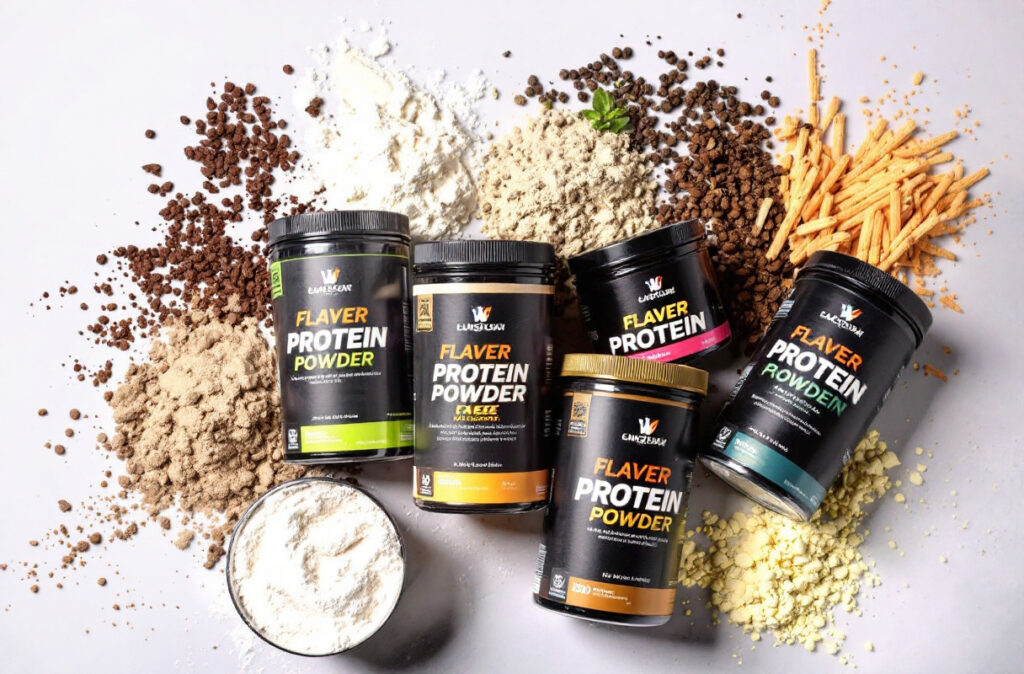
Texture and Mixability
How your protein powder mixes and feels is a big deal, especially if you’re downing shakes on the regular. Whey protein scores high for its silky, smooth texture and mixes like a dream. Just give it a shake with any liquid, and you’ll have a creamy drink without any nasty lumps to ruin your day.
Plant protein is the health-conscious sibling that tends to be a little granular. Its texture requires patience when mixing due to those little plant bits. But fear not—modern day wizardry has led to plant powders that mix better and feel smoother.
| Protein Type | Texture | Mixability |
|---|---|---|
| Whey Protein | Smooth, Creamy | Awesome |
| Plant Protein | Slightly Gritty | Good to Decent |
Grasping the differences in taste and texture can steer you towards the protein that best meets your workout fuel needs. Want the lowdown on how proteins play into bouncing back after exercise? Check out our article on post-workout recovery supplements.
Cost Analysis
Choosing between whey and plant protein? Cost might just sway your decision. Here’s the lowdown on what your wallet might whisper to you.
Price Comparison
Whey and plant proteins don’t sit at the same price table due to how they’re sourced and processed. Here’s a peek at how they measure up:
| Protein Type | Average Cost per Serving | Average Cost per Pound |
|---|---|---|
| Whey Protein | $1.00 to $1.50 | $10.00 to $20.00 |
| Plant Protein | $1.00 to $2.00 | $12.00 to $25.00 |
Whey often edges out plant protein on a per-serving basis in terms of affordability. But prices can dance to different tunes depending on things like organic labels, extra ingredients, and how fancy the brand wants to be. If you’re eager to dive into the protein powder pool, go on and read our piece on how to choose protein powder.
Value for Money
Just looking at price tags doesn’t cut it. You gotta think about stuff like protein quality, how easily it digests, and any bonus nutrients that might be thrown in.
| Protein Type | Protein Quality (BV) | Digestibility (PDCAAS) | Additional Nutrients |
|---|---|---|---|
| Whey Protein | 104 | 1.00 | Packed with BCAAs, glutamine, vitamins |
| Plant Protein | 50-70 (varies) | 0.75-1.00 | Loaded with fiber, vitamins, minerals |
Whey wins with a high biological value (BV) and a top-notch digestibility score (PDCAAS). It’s full of goodies like BCAAs and glutamine, which your muscles will thank you for. Hungry for more recovery secrets? Check out our take on post-workout recovery supplements.
Plant protein can be a mixed bag quality-wise, but it loves flexing its fiber and vitamin muscles. This makes it a favorite for vegans or anyone else whose taste buds march to a different beat. Curious about plant-based picks? Peek at our guide on vegan sports supplements.
How do you know what’s worth the cash? Factor in your likes, diet, and what gets you moving. Chatting with a nutritionist? That might just be the way to nail down what suits you best. For a deep dive into choosing smart, check our trusty guide on how to choose protein powder.
Making the Choice
When weighing Whey vs Plant Protein options, consider your personal goals and dietary needs
Picking between whey and plant protein isn’t a one-size-fits-all deal. What you’re into, your workout targets, and chatting with a nutritionist can really steer your decision.
Personal Preferences
Everyone’s got their own likes and needs when it comes to food. What you dig might be a major factor in what you pick. Whey protein’s famous for being smooth like a milkshake with oodles of flavors. But, if earthier flavors are your scene, or you’re on a plant-based kick, plant protein offers lotsa tasty options.
Think about what you eat and the life you live:
- Lactose Intolerance: If milk and you aren’t pals, maybe keep away from whey.
- Dietary Choices: If you’re vegan or vegetarian, plant protein’s probably your jam.
Curious about going vegan with your workout? Peep our piece on vegan sports supplements.
Fitness Goals
Your workout game changes whether whey or plant protein fits best. Their different vibes might jive with what you wanna achieve.
| Goal | Whey Protein | Plant Protein |
|---|---|---|
| Muscle Building | Quick to hit your system, packed with key amino acids | More of a slow and steady pace, great for constant fuel |
| Endurance Training | Fast fuel, teams up well with endurance supplements | Energy that lasts, awesome for the long haul |
| Weight Management | Light on calories, keeps muscle on | Higher in fiber, keeps you fuller for longer |
Matching the right protein to your fitness plan can spell success. Pumped to build muscle? Check out our scoop on supplement stacking for muscle gain.
Chatting with a Nutritionist
A nutritionist or dietitian can handcraft advice, just for you. They’ll look into allergies, how your tummy feels, and your overall dietary needs.
Here’s what the pros offer:
- Custom Plans: Fine-tuned tips based on your health diets
- Balanced Diet: How to toss protein into your everyday eating
- Health Check-Ins: Monitoring to see what’s working and tweak what’s not
Got food quirks or medical stuff to juggle? A pro makes sure your protein picks jive with your health aims. Swing by our guide on how to choose protein powder for even more tidbits.
In the end, choosing between whey and plant protein isn’t just about one thing. It’s your taste, your goals, and a little help from someone who knows their stuff, shaping what’s best for you.
Conclusion :
Understanding the key differences in the Whey vs Plant Protein comparison helps make an informed choice.
The choice between whey and plant protein ultimately comes down to your individual needs, goals, and values.
While whey protein offers rapid absorption and a complete amino acid profile, plant proteins bring their own advantages with additional nutrients and environmental benefits.
Whether you prioritize muscle building, digestive comfort, environmental impact, or dietary restrictions, both options can effectively support your fitness journey when chosen thoughtfully.
Remember to consider factors like taste preferences, budget, and any specific health considerations when making your decision.
By understanding the unique characteristics of each protein type and how they align with your personal goals, you’re now equipped to make an informed choice that will best support your fitness and wellness journey.
FAQs
1.Which protein type is better for muscle building?
While both can support muscle growth, whey protein typically has an edge due to faster absorption and higher leucine content. However, well-formulated plant protein blends can be equally effective.
2.How do absorption rates differ between whey and plant proteins?
Whey protein absorbs rapidly (within 1-2 hours), while plant proteins generally have slower absorption rates (2-3 hours or more), which can provide sustained amino acid release.
3.Can plant proteins provide all essential amino acids?
While single plant sources may lack certain amino acids, properly combined plant proteins (like pea + rice) can provide all essential amino acids similar to whey protein.
4.Which protein is better for digestive health?
Plant proteins often contain fiber and may be easier to digest for those with dairy sensitivities. However, whey isolate can be suitable for those who are lactose intolerant.
5.How do environmental impacts compare?
Plant proteins generally have a lower environmental impact, requiring less water, land, and producing fewer greenhouse gas emissions compared to whey protein production.
Resources:
Journal of the International Society of Sports Nutrition: Protein Comparison https://jissn.biomedcentral.com/articles/protein-comparison
American Journal of Clinical Nutrition: Plant vs Animal Protein
https://academic.oup.com/ajcn/plant-vs-animal-protein
Sports Medicine: Protein Quality and Athletic Performance
https://link.springer.com/journal/40279
Environmental Science & Technology: Protein Environmental Impact
https://pubs.acs.org/journal/esthag
Examine.com: Protein Source Comparison
https://examine.com/supplements/protein-comparison

